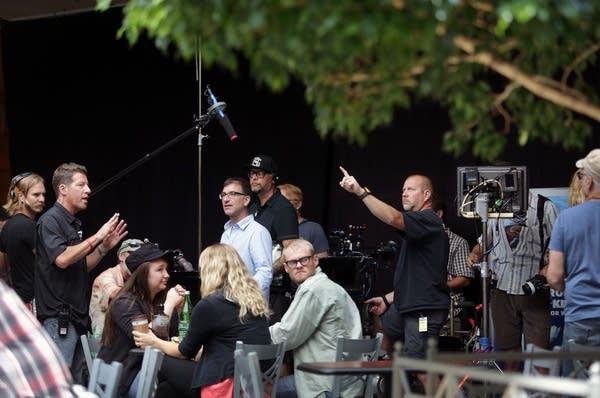Tinseltown meets taconite with two film premieres this weekend

Go Deeper.
Create an account or log in to save stories.
Like this?
Thanks for liking this story! We have added it to a list of your favorite stories.
Two movies filmed on the Iron Range have their Minnesota premieres this weekend as part of the Duluth Superior Film Festival. Both are generating some film festival buzz, and both benefited from a pair of subsidies designed to lure filmmakers to the state.
But even as those incentives draw more productions to Minnesota, they also continue to draw criticism.
The film "After the Reality" tells the story of a woman taking care of her dying father. She reconnects with her brother, a reality TV dating-show star. It was shot largely at Nelson's Resort on Crane Lake, near the Canadian border.
Minnesota native David Anderson wrote and directed the film.
Turn Up Your Support
MPR News helps you turn down the noise and build shared understanding. Turn up your support for this public resource and keep trusted journalism accessible to all.
"Basically, I knew I wanted to shoot in northern Minnesota, not only for the beauty but also because of the financial aspect," Anderson said. "My dollar would go so much farther."
That's because Minnesota's so-called "Snowbate" incentive offers filmmakers a 20 percent rebate on money they spend in the Twin Cities and 25 percent for films shot outside the metro region. The Iron Range Resources and Rehabilitation Board tacks on an additional 20 percent for money spent on movies shot in northeast Minnesota.
"So those two rebates together made shooting in northern Minnesota a no-brainer," Anderson said.
The film features some familiar TV actors: Matthew Morrison, of "Glee" fame, and Sarah Chalke, who starred on "Scrubs." It kicked off the prestigious Newport Beach Film Festival this spring.
Another movie making its Minnesota debut this weekend is "I Am Not a Serial Killer." Filmed in Virginia and Hibbing, it stars Christopher Lloyd, who played Doc Brown in the "Back to the Future" movies. The film premiered at South by Southwest this year.
And the high-profile film "Wilson" comes out this fall. It was shot in the Twin Cities last year and stars Woody Harrelson and Laura Dern.

Lucinda Winter, who directs the Minnesota Film & TV Board, said the state is starting to reap the benefits of consistently funding Snowbate. "We've never had as much money as we've received in the last three years," she said.
The state Legislature has granted the program $13.5 million over that period, plus $6 million more for the budget year starting in July. That will be the most the program has received in a single fiscal year.
Minnesota was the first state to offer a film subsidy about 20 years ago, after many productions moved to Canada to take advantage of a favorable exchange rate. Winter said when that subsidy ended a decade ago, Minnesota disappeared from filmmakers' radars.
"And once you're off the radar in Hollywood and New York and even with independent filmmakers and commercial makers, it takes some time to build awareness of your program and trust in your program," she said.
Subsidies are commonplace now.
Thirty-five states offer them. But some in the industry argue Minnesota needs to invest even more to compete with states like Georgia and New Mexico, which dole out $50 million or more every year.
Anne Healy Shapiro, a Minneapolis-based location scout, has worked in the business ever since she got her first break working on the movie "The Mighty Ducks" in the early '90s. "It's hard to watch," she said. "I've watched most of my friends leave the state, because they can't support themselves here anymore."
The smaller-budget movies that Minnesota attracts often don't pay living wages, she said.
"These are the bottom-of-the-barrel people who come here looking to take advantage of us," Shapiro said. "And the nice people of Minnesota, bless their hearts, will work until their hands are bloody, and not complain."
Riki McManus, who directs the Upper Minnesota Film Office, said smaller movies do play an important role.
"Right now, I think we are training up a crew," she said. "And I think that is very worthy also."
Lucinda Winter said smaller films will help create the workforce for the larger projects she hopes to attract.
Some Republicans in the state Legislature have tried to eliminate the state's film subsidy. Rep. Pat Garofalo, R-Farmington, said there are better ways to create jobs in Minnesota.
"For example, by incentivizing technological infrastructure, by investing in math and science education," he said. "Those are going to be more permanent, long-lasting jobs."
That debate will likely continue in St. Paul. Meanwhile, in the tiny town of Cook this weekend, the Comet Theater will bring a little bit of Hollywood to the Iron Range. It hosts the Minnesota premieres of "After the Reality" and "I Am Not a Serial Killer" on Sunday.
MPR News reporter Brian Bakst contributed to this report.
Correction (June 3, 2016): An earlier version of this story misstated where the Comet Theater is located.


